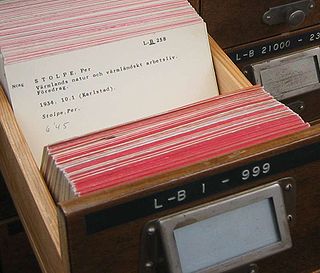
A punched card is a piece of card stock that stores digital data using punched holes. Punched cards were once common in data processing and the control of automated machines.

A smart card (SC), chip card, or integrated circuit card, is a card used to control access to a resource. It is typically a plastic credit card-sized card with an embedded integrated circuit (IC) chip. Many smart cards include a pattern of metal contacts to electrically connect to the internal chip. Others are contactless, and some are both. Smart cards can provide personal identification, authentication, data storage, and application processing. Applications include identification, financial, public transit, computer security, schools, and healthcare. Smart cards may provide strong security authentication for single sign-on (SSO) within organizations. Numerous nations have deployed smart cards throughout their populations.
HyperTalk is a discontinued high-level, procedural programming language created in 1987 by Dan Winkler and used in conjunction with Apple Computer's HyperCard hypermedia program by Bill Atkinson. Because the main target audience of HyperTalk was beginning programmers, HyperTalk programmers were usually called "authors" and the process of writing programs was known as "scripting". HyperTalk scripts resembled written English and used a logical structure similar to that of the Pascal programming language.

A library catalog is a register of all bibliographic items found in a library or group of libraries, such as a network of libraries at several locations. A catalog for a group of libraries is also called a union catalog. A bibliographic item can be any information entity that is considered library material, or a group of library materials, or linked from the catalog as far as it is relevant to the catalog and to the users (patrons) of the library.

Secure Digital, officially abbreviated as SD, is a proprietary, non-volatile, flash memory card format the SD Association (SDA) developed for use in portable devices.

A Rolodex is a rotating card file device used to store a contact list. Its name, a portmanteau of the words "rolling" and "index", has become somewhat genericized for any personal organizer performing this function, or as a metonym for a total accumulation of business contacts. In this usage, it has generally come to describe an effect or characteristic of the small-world network of a business's investors, board of directors, or the value of a CEO's contacts, or in organizational structure. Models have been exhibited in the Smithsonian Institution.
A credit history is a record of a borrower's responsible repayment of debts. A credit report is a record of the borrower's credit history from a number of sources, including banks, credit card companies, collection agencies, and governments. A borrower's credit score is the result of a mathematical algorithm applied to a credit report and other sources of information to predict future delinquency.

An index card consists of card stock cut to a standard size, used for recording and storing small amounts of discrete data. A collection of such cards either serves as, or aids the creation of, an index for expedited lookup of information. This system is said to have been invented by Carl Linnaeus, around 1760.
A two-line element set or three-line element set (3LE) is a data format encoding a list of orbital elements of an Earth-orbiting object for a given point in time, the epoch. Using a suitable prediction formula, the state at any point in the past or future can be estimated to some accuracy. The TLE data representation is specific to the simplified perturbations models, so any algorithm using a TLE as a data source must implement one of the SGP models to correctly compute the state at a time of interest. TLEs can describe the trajectories only of Earth-orbiting objects. TLEs are widely used as input for projecting the future orbital tracks of space debris for purposes of characterizing "future debris events to support risk analysis, close approach analysis, collision avoidance maneuvering" and forensic analysis.
The Color Association of the United States (CAUS), known until 1955 as the Textile Color Card Association of the United States (TCCA), is an independent color trend forecasting and color consulting service to the business community, known for its textile color swatch book, the Standard Color Reference of America.

A library card can refer to several cards traditionally used for the management of books and patrons in a library. In its most common use, a library card serves similar functions as a corporate membership card. A person who holds a library card has borrowing or other privileges associated with the issuing library. The library card also serves as a method of identification. When a person chooses an item to borrow and presents their library card to the library, they take responsibility for the borrowed item and promise to abide by certain rules, usually including a promise to return the item by the due date or face a library fine. If the cardholder violates these responsibilities, their borrowing privileges may be suspended.
The Browne Issue System is an old system for loaning library books, developed by Nina Browne in 1895.

James Henry Rand Jr. was an American industrialist who revolutionized the business record industry. He founded American Kardex, an office equipment and office supplies firm which later merged with his father's company, the Rand Ledger Corporation. Rand later bought out and merged with several other companies, notably the Remington Typewriter Company, to form Remington Rand. In 1955, Rand merged his corporation with the Sperry Corporation to form Sperry-Rand, one of the earliest and largest computer manufacturing companies in the United States.

An arrival card, also known as an incoming passenger card, landing card or disembarkation card, is a legal document used by immigration authorities of many countries to obtain information about an incoming passenger not provided by the passenger's passport and to provide a record of a person's entry into the country. The card may also provide information on health and character requirements for non-citizens entering the country. Some countries require an arrival card for each incoming passenger, while others require one card per family unit, and some only require an arrival card for non-citizens only.
Kardex Holding AG, headquartered in Zurich, Switzerland, offers intralogistics solutions. It specializes in automated storage and retrieval systems, integrated material handling, small parts storage, and automated high-bay warehouses for modern warehouses in a variety of industries. Employing around 2,500 people across 30+ countries, Kardex Holding AG has been listed on the SIX Swiss Exchange since 1989.

The Ghana Card is the national Identity card that is issued by the Ghanaian authorities to Ghanaian citizens – both resident and non-resident, legal and permanent residents of foreign nationals. It is proof of identity, citizenship and residence of the holder. The current version is in ID1 format and biometric. It is issued by the National Identification Authority of Ghana and Regarded as a property of the country as such. In July 2023, through the initiative of the Vice President, Dr. Mahamudu Bawumia, new card numbers were issued to newborn babies as part of pilot program to incorporate newborn babies unto the database.

The Library Bureau was an American business founded by Melville Dewey in 1876 to provide supplies and equipment to libraries. The Library Bureau quickly became a one-stop vendor for supplies and equipment a library might need. By 1900, its lengthy, well illustrated catalog was widely distributed.

Ration cards are an official document issued by state governments in India to households that are eligible to purchase subsidised food grain from the Public Distribution System under the National Food Security Act (NFSA). They also serve as a common form of identification for many Indians.
A ballot marking device (BMD) or vote recorder is a type of voting machine used by voters to record votes on physical ballots. In general, ballot marking devices neither store nor tabulate ballots, but only allow the voter to record votes on ballots that are then stored and tabulated elsewhere.












